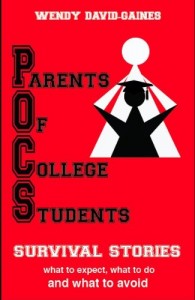One of the joys of posting on this blog is that I get to recommend other college prep professionals. Over the course of the last few years, I have gotten to know Wendy David-Gaines (aka ParentsOfCollegeStudentMom). She offers some of the best college advice from the parent community. I’ve read her book, Parents of College Students: Survival Stories, and I’ve collaborated with her on blog posts. Not only is she a wonderful person, but her knowledge of the college-prep process and issues that occur once your student enters college is second to none.
 Wendy is famous for exposing the cliches about college. After giving the cliche, she gives you the “POCS reality”. In her book, Wendy does this effectively by compiling actual parent stories. The stories (both from pre-POCS and POCS) are simple, light-hearted, often humorous and an easy read. But here’s the clincher–they provide parents with added insight into each individual situtation. For instance, Wendy has a story about college touring in her book. The cliche: different strokes for different folks. The POCS Reality: just because a parent likes a college does not mean his student will. The story tells about the often-experienced reality of a college-bound teen not “feeling” a campus like his parent does. If you haven’t experienced it yet, you will.
Wendy is famous for exposing the cliches about college. After giving the cliche, she gives you the “POCS reality”. In her book, Wendy does this effectively by compiling actual parent stories. The stories (both from pre-POCS and POCS) are simple, light-hearted, often humorous and an easy read. But here’s the clincher–they provide parents with added insight into each individual situtation. For instance, Wendy has a story about college touring in her book. The cliche: different strokes for different folks. The POCS Reality: just because a parent likes a college does not mean his student will. The story tells about the often-experienced reality of a college-bound teen not “feeling” a campus like his parent does. If you haven’t experienced it yet, you will.
Here are just a few comments from parents who have read her book:
“The cliches used in this story don’t seem like cliches anymore. The way David-Gaines reinterprets them makes these cliches into lessons that may otherwise be overlooked for parents who are about to send their children off to college. The short stories are quick, easy reads. I read the book through from beginning to end, but you could start with any particular chapter or even open to a random page for a good lesson and laugh. I recommend this as a fun, enjoyable, helpful read for parents who are starting or already involved in the college process.”
“Being the Parent of a College Student (POCS) is hard work and can be very frustrating. I felt like Wendy had been with me on my journey through the college admission’s maze. Her book is very entertaining and packed with lots of helpful information whether you are just starting the process or have a student in college. I thought I would skim through it, but I was hooked after the first story. I wholeheartedly recommend it!”
Wendy doesn’t stop with her book, however. She authors a blog on her website, and she also writes for Examiner.com on a regular basis. Do yourself a favor and check her out on Twitter (@pocsmom) as well because she tweets great information for both pre-POCS and POCS.
Get your copy of her book, Parent of College Students: Survival Stories today!









